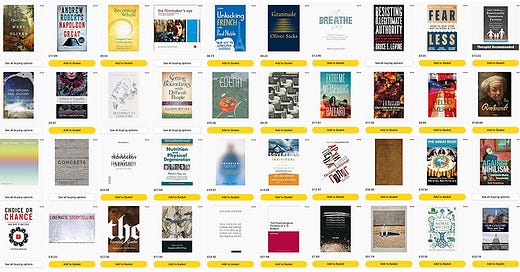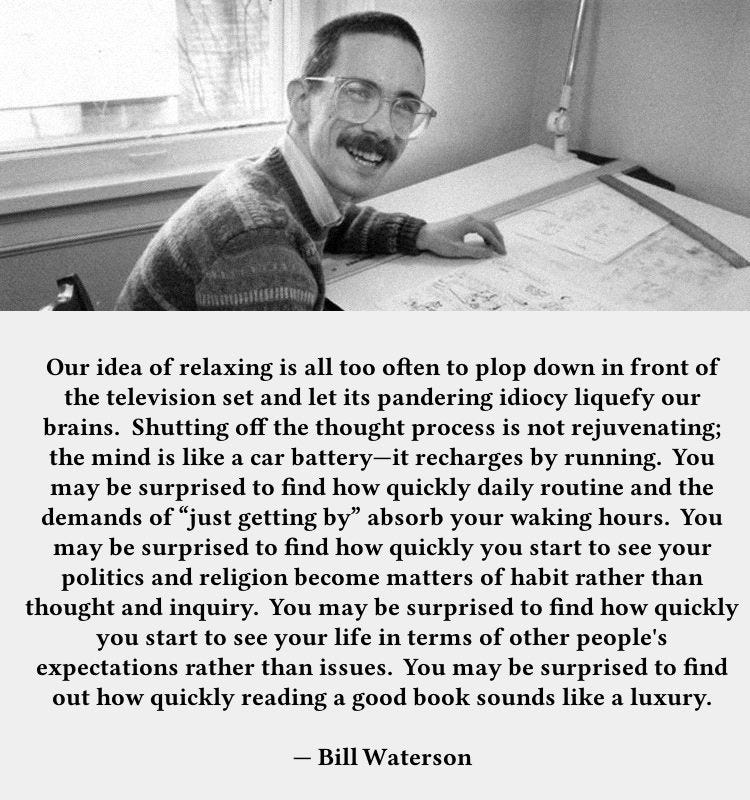I was recently on Amazon and came across a list of books I’d saved and intended to buy later. A literary graveyard of fleeting whims accumulated over the past two or three years.
It contained a bit of everything. Books on mental health, Norse myths, biographies of Rembrandt, Saint Paul and Goethe, a graphic novel by Moebius, and a book about concrete.
It reflects a series of near purchases while surfing Amazon. None have been bought. But at some point all were targets for reading, however brief the intention.
The books reflect an organic development. My preoccupations over the last few years, at least while on Amazon. A strange, unplanned overview of my recent interests.
I’d read most right now, so it is not that my tastes have dramatically changed. But it makes me wonder why does this happen? Why do I have a big list of unread books?
We can of course misjudge how much time we have. Many of us are poor at planning. It is said we overestimate what we can do in a day and underestimate what we can accomplish in a year if we keep at it. Maybe the saved, unread books are just a visible manifestation of poor time management.
A related reason is being optimistic about our abilities. In an era of distraction how many of us carve out the time needed to sit and read? How many of us used to read but now find our attention more fragmented after abusing ourselves with our toy rectangles?
A saved list of books is not all negative of course. It tells us something important. We at least know the value of reading.
We are told many don’t read at all. They don’t have a virtual pile of books waiting in the wings. They have been taken prisoner by internet demons and will never escape the mental maze created by their hijacked attention spans.
Despite my concerns about digital addiction I have always loved books. They occupy a unique place in culture for many of us even in this electronic era we live in.
We still value holding a real, physical volume in our hands. Compared to the synthetic experience of being immersed online even a cheap paperback feels much higher quality. At some level we are aware the book has probably been edited, proofread, typeset and a cover designed. A lot of work for a team of people. As a result it represents something more substantial than much of the online fodder we consume.
But I still ended up with a lot of unread books saved on a list on Amazon. Why save them and not just buy them? Or why not just forget about them altogether? Perhaps the message is not just about books. Is the list of unread books my unconscious mind telling me something?
Maybe it is an obvious message, that I should read more books. A related but less obvious message might be, spend less time online, including browsing Amazon. More time in the physical world.
Maybe it is a productivity thing. I should evaluate my timetabling. Do the books represent me wasting time? A visible reminder of things not done?
Why am I in a position I have dozens of unread books, too many to conceivably read without significant time investment? Why does reading feel like a luxury? Compared to a younger me I didn’t imagine I’d end up here. So how does that happen?
So perhaps it is a personal alarm, an awareness I am not making the time to read. Plus it suggests I’m filling up the time with other things that may need curtailed.
The unread book list was a minor shock to the system. It made me think, just like a good book. I needed to evaluate what I was doing and how much time I lost to online consumption or other activities I don’t value.
I am not bad. I don’t binge watch TV and don’t use social media. So I perhaps have fewer distractions than some.
Yet I still can’t find time to read. But of course this is not true. No one finds time, they make time. The book list is telling me I am not making time to read.
Put another way I have different priorities, But clearly in those bookmarking moments, when I save the book, I am considering reading.
The act of saving for later rather than buying, however, gives the game away. If I was confident in my reading time options I would just buy the book.
The save-for-later impulse is perhaps my subconscious telling me it doesn’t buy the plan, so don’t get the book right now. Some part of me is immune to my poor planning skills.
If we broaden this out to all that is important then you don’t find time you make time. You prioritize your time as it is a limited resource.
Perhaps the economic metaphors help us most. We pay attention, we spend time on activities, we waste time. The terminology passes us by unnoticed but it holds the real truth.
Our time is precious, a limited resource and it therefore must be managed to avoid squandering it.
We would do well to be conscious about this.
The philosophy is equally applicable to all manner of activities; exercise, grabbing a coffee with a friend, or life in general. Time gets away from us all too easily. And today in our post-lockdown world more seem to be withdrawing from these kinds of activities and becoming hermits.
So maybe that is all the books on Amazon really are. A visual register of things I meant to get to and didn’t.
What if we had an equivalent register for everything? The friends we didn’t bother to meet for a coffee, the potential spouses we didn’t romance, the jobs or careers we didn’t pursue. Satisfying creative projects we didn’t get to. What would that feel like seeing a visual marker for every failed moment?
So maybe the lesson is just to be more aware we can make poor use of our time. Spend it wisely or lose it forever. Whatever nominal time I thought I’d spend over the last two or three years in these books is gone now forever.
And that is a reality we must all accommodate. Time flows in one direction. We don’t get it back. Reading time, friends time, spouse time, kids time, it all flows past if we are lost in distraction.
So perhaps the reminder from Amazon is not about books. It is just a visible representation of lost time.







I thought at first you were going to reflect on how that list represents a change in your interests, then I realized your very valid point that it represents a lack of reading time. Life is harder today, it takes up more time, people work longer hours, or commute further, there is more traffic, everything takes longer. The efficiencies of a homemaker in most homes made a lot of creative space, reflected in the often meticulous hobbies of both men and women of the past, or the many social activities of clubs, bowling, etc. everyone’s life these days seems impoverished with regard to time despite the shiny technological improvements. Better planning will certainly help with the use of time, but might not create more of it.
I was looking over my books on kindle to create a collection for my 12 year old grandson with two broken arms. We have thousands of real books but they are hard for him to hold right now and he is a voracious reader, having lots of that time which is so elusive for adults. I realize how my kindle books represent the obsessions of the moment, though most are cheap out of copyright classics. There are the books dealing with disease and disability when I was first diagnosed 14 years ago with a hereditary, deteriorating, condition. Then the dog books when we got our German Shepherd puppy, now aging toward the end which always comes too soon. It’s is a little like a diary, this collection of kindle books.
Thought provoking essay, thank you!
I used to read at least a dozen books a year for several decades until 2013 when the "Smart Phone” became a constant in my life. then I stopped reading for almost a decade. this was disappointing at first but it gradually became a deep source of shame. occasionally I would do as you and browse book lists and dreamily pick out ones that caught my interest. I even bought a few. but I never read a page. then, two years ago, I got rid of all SM and my “Smart Phone” and made myself read. without the constant noise and distraction, I fell back into it with ease. like riding a bike. regardless, I still have to discipline myself to make time for reading in a way I didn’t in the pre digital times. the machine God is a powerful one, and he never sleeps.
sometimes I feel that our salvation lies not in how to create a better world, but in remembering what we’ve lost…and recovering it.